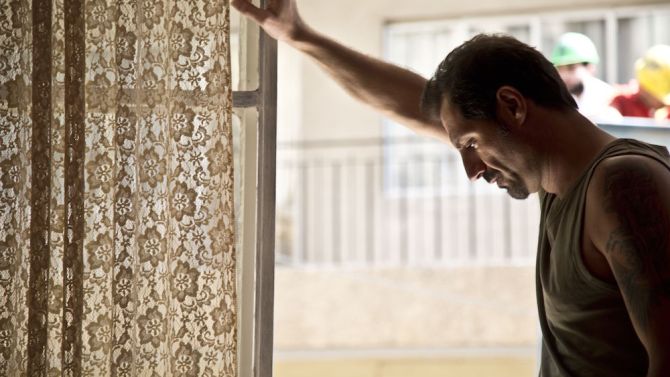
THE INSULT (L’insulte)
Cohen Media Group
Director: Ziad Doueiri
Written by: Ziad Doueiri, Joëlle Touma
Cast: Adel Karam, Rita Hayek, Kamel El Basha, Christine Choueiri, Camille Salamé, Diamand Bou Abboud, Georges Daou
Screened at: Critics’ link, NYC, 1/7/18
Opens: January 26, 2018
Sometimes a judicial case causes repercussions well beyond the courtroom. Consider how the extradition by Mexico of Joaquín “El Chapo” Guzmán for trial in a New York court must have helped to influence President Trump to push for an $18 billion wall on our border with Mexico to keep out (as he put it) their rapists and criminals that illegally enter our country. Though fictional, the judicial proceedings that involve two warring sides in Ziad Doueiri’s “The Insult” inflame all of Lebanon and bring up memories from that country’s recent past, including the horrendous civil war 1975-1990 that resulted in the death of 120,000 Lebanese and a massive exodus as in Syria today. Partly as a result of people’s memories, hostilities remain between Christians and Muslims that have been partly resolved by a power-sharing agreement.
The judicial proceedings in Doueri’s film—from a director whose “The Attack” centered on a Tel Aviv Arab surgeon who learns a dark secret about his wife—bring to the surface the only mildly repressed antagonisms between the Christian population and the Palestinians living in Lebanon. The Palestinians feel humiliated that they are treated like refugees with no avenue to citizenship, while the Christians who are four times more numerous, simply resent the influx of the people in the same way that Trump begrudges most immigration from the Middle East.
“The Attack,” one of my favorites from 2012, finding Doueri’s raising the tension until it reaches fever pitch, has resonance in his current work. There is no wonder that Lebanon has entered “The Insult” into our Oscar competition where it will compete against such emotional stories as the remarkable German entry and my own favorite, “In the Fade.”
Part courtroom drama, “The Insult” allows the audience to go not only beyond the trial but into the broad, unfortunate ways that people can differ with one another, even justifying physical violence before considering peaceful settlements. A fairly innocent quarrel leads to a case which, upon appeal, draws high dudgeon among the Lebanese people, even resulting in a conference arranged by Lebanon’s present not unlike the “beer summit” that Mr. Obama set up between an allegedly racist cop and an innocent African-American professor.
The two principals are Yasser (Kamel El Basha), a Palestinian Muslim refugee who is foreman of a company that repairs building-code violations; and Tony (Adel Karam), a car mechanic seen early on watering his plants on his own balcony. When Yasser explains to Tony that he must fix a leaky pipe, Tony, recognizing a Palestinian (“not one of us,” “the enemy,” “the devil”), slams the door in his face. A confrontation follows—the kind of thing you expect from macho men but rarely from women—as Tony tells Yasser that he wishes Ariel Sharon would wipe out [all the Palestinians like you]. (Viewers unfamiliar with the conflict between Israel’s late Prime Minister and Palestinian refugees in a camp can find considerable information in Wikipedia.) Yasser, by all other standards the milder man, responds with a punch, breaking two of Tony’s ribs and ostensibly causing Toni’s pregnant wife Sharine (Rita Hayek) to deliver a baby that needs temporary life support.
The case itself revolves around a law that states no crime is involved if you use physical violence when under extreme stress. Yasser and Tony go court; first before a magistrate who throws it out, then in a nationally followed appellate division. The case engages the entire country, right-wing Christians including members of the Christian party supporting Tony while Palestinian refugees in the court occasionally causing noisy protests. Three magistrates hear Wajdi (Camille Salameh), a high-level lawyer supporting militant Christian politics, facing against his own daughter Nadine (Diamand Bou Abboud), a novice, though one more high-minded and supportive of the Palestinian cause.
The real principle, the overriding theme, is this: what happens when two opposing sides each considers itself a victim of long-lasting injustice? Israelis today point to the Holocaust as a prime factor for insisting on a homeland denied to them for 2,000 years. Palestinians consider the land which was promised to them now occupied by Israeli Jews. Two victims, two rights in conflict. The educated viewer cannot help looking at “The Insult” and thinking of a huge array of oppressors and victims, sometimes each claiming to be both. The trial scenes and the rallies in Beirut largely by Christians point to the trial as a touchstone for renewed violence. That’s not all. To its credit, director Ziad Doueiri, with co-writer Joëlle Touma, deliver a feminist message: that women are the caregivers of society with an overriding interest in stability having to face a tough fight against the male gender for whom honor and winning are paramount.
Tommaso Fiorilli behind the lenses gives us clear pictures of the trial and especially of the enthusiastic, partisan rallies outside. There is enough drama in this film to warrant the subtler use of music. The look of the almost two-hour work, should have the Oscar voters’ work cut out.
Unrated. 113 minutes. © Harvey Karten, Member, New York Film Critics Online
Comments, readers? Agree? Disagree? Why?
Story – A-
Acting – A-
Technical – B+
Overall – A-





